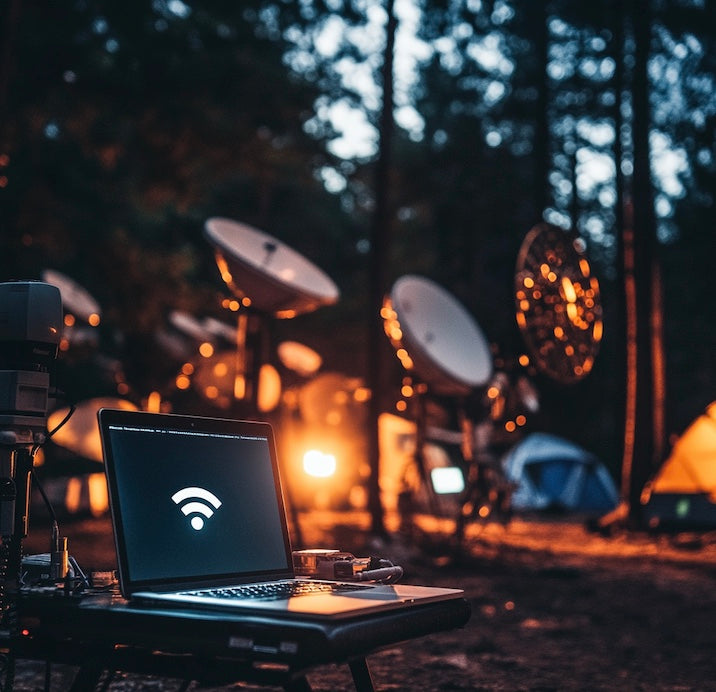In our previous blog post, we wrote about the growing popularity of digital nomads and vanlife enthusiasts. These days, internet access at the campsite is more than just a luxury for everyone. Although many consider it an unnecessary luxury, there are campers who simply cannot do without good accessibility and access to the World Wide Web. Quickly look up that recipe, check the latest news at home, stream your favorite show, or check directions to the nearest supermarket—it's all so much easier with Wi-Fi. But anyone who camps often knows: good Wi-Fi at the campsite isn't a given. Fortunately, there are plenty of ways to stay connected while camping. We'll give you the most useful tips.
Why Wi-Fi at the campsite is often disappointing
Let's be honest: the average campsite Wi-Fi is slow, unstable, and often only available in a few spots. This is because many campsites only have one or a few Wi-Fi hotspots, with hundreds of guests trying to log in simultaneously. Are you on the other side of the property or in the middle of a wooded area? Then chances are you'll barely have any reception. And even if you do have a connection, the speed is often not suitable for more than a quick surf or sending an email. Streaming? Forget it. The tips below are only for those who can't camp without good Wi-Fi.
Tip 1. Choose a smart camping spot
Sounds obvious, but it really helps: a good pitch makes a world of difference. Wi-Fi antennas are often located near the restrooms or reception. If you're standing nearby, you're more likely to get a decent signal.
• Walk around with your phone and check the signal strength in different places
• Ask about the best Wi-Fi locations when you check in
• Avoid areas with lots of trees, campers or metal objects – they block the signal
Tip 2. Use a Wi-Fi booster
A Wi-Fi booster (or repeater) is ideal if you have a connection but the signal is weak. It picks up the existing Wi-Fi signal and rebroadcasts it, increasing your range.
Tip 3. Create your own network with a MiFi router
Want to be completely independent of campsite Wi-Fi? Then a MiFi router is the perfect solution. This is a small device into which you insert a SIM card with data. The router then creates its own Wi-Fi network that you can use with all your devices. It's helpful to make sure you have an unlimited data plan.
Advantages:
• Your own, stable network, without having to reconnect every time (as with a hotspot)
• Also works on the go, for example in the car or at a picnic spot
• Ideal for those who travel in multiple countries – choose a European or worldwide data bundle
Note: check for good mobile coverage at your campsite. Even 4G can be intermittent in a remote valley. It's a good idea to check whether you have an unlimited data plan and to carefully review your provider's fair-policy policies.
Tip 4. Use your phone as a hotspot
Do you have a good data plan and excellent reception? Then you can use your smartphone as a personal hotspot. Simply turn on the hotspot function, connect your other devices, and you're done.
Tip:
• Turn off automatic updates
• Only use equipment that is really necessary
• Keep an eye on your data usage, especially abroad
Tip 5. Limit data usage = stay online longer
Whether you're using campsite Wi-Fi or your own network, it's wise to be careful with your data. Small adjustments can make a big difference.
• Lower the stream quality on YouTube or Netflix
• Turn off automatic app updates and cloud syncing
• Download series of maps in advance via Wi-Fi at home
• Close apps on your phone that are using data in the background
Tip 6. Think about your security: use a VPN
Campsites often offer open networks – convenient, but also vulnerable. Anyone on them could theoretically be watching. Want to browse the internet safely? Use a VPN. It encrypts all your traffic, providing better protection from snoopers and hackers.
There are numerous affordable VPN providers, such as NordVPN, Surfshark, and ExpressVPN. They're easy to use and work well on your smartphone or tablet.
Tip 7. Alternatives: internet cafes, local SIM cards or even offline
Sometimes it's not worth the effort to keep messing around with poor Wi-Fi. Consider these options:
• Go to a local cafe or restaurant with good WiFi – often faster than at the campsite
• Buy a local prepaid SIM card with data – ideal for longer stays in one country
• Or… enjoy the peace and quiet and turn off your screen for a while. You're on vacation after all.
Conclusion
Camping Wi-Fi can be a challenge, but it doesn't have to be a nightmare. With a little preparation—and the right tools—you can stay connected seamlessly at your holiday destination. Whether you just want to check your email, video chat with friends, or stream a movie under your awning in the evening, there's always a solution.
And don't forget: sometimes it's just wonderful to be completely unreachable. Enjoy nature offline, without notifications or data overload. That's camping too.

